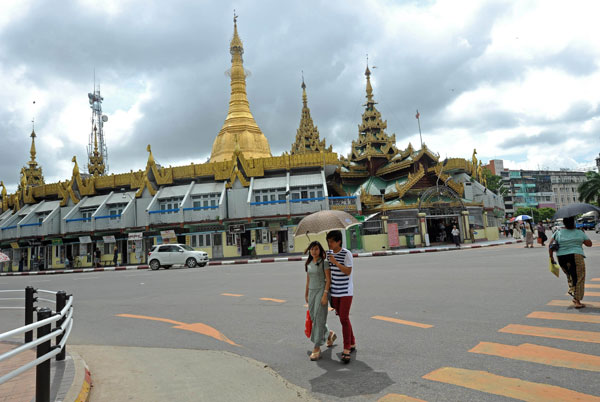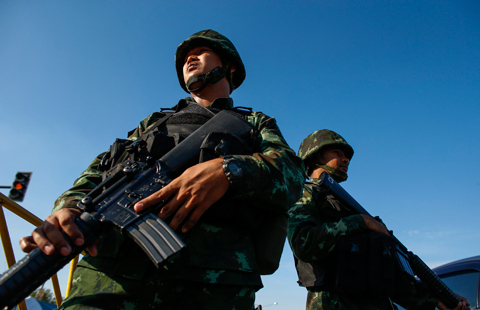Myanmar weighs religious marriage curbs
By Agence France-Presse in Yangon, Myanmar (China Daily) Updated: 2014-06-26 07:13Proposals by radical Buddhist monks to criminalize interfaith marriage in Myanmar face strong opposition from women's rights groups in a tussle over the nation's religious identity that has sparked international alarm.
Buddhist nationalists, feeding off the fear and uncertainty caused by successive waves of anti-Muslim violence, have issued fiery pronouncements that the very fabric of the country's main religion is under threat, casting a dark shadow over ongoing democratic reforms.
The marriage law is one of four bills suggested by a hardline faction within the Buddhist clergy and put to the fledgling parliament by the president.
|
 A couple cross a road in front of Sule pagoda in Yangon recently. Proposals by radical Buddhist monks to criminalize interfaith marriage in Myanmar face strong opposition from women's rights groups in a tussle over the nation's religious identity. Soe Than Win / Agence France-Presse |
To "protect" Buddhism - the religion of more than 80 percent of the population - radical monks have urged boycotts of Muslim businesses, including of Qatari telecom firm Ooredoo, despite its promise to bring much-needed affordable mobile access.
And they have warned that Buddhist women are at risk from Muslim men, a tactic "calibrated for emotional impact", said Nicholas Farrelly, a research fellow at the Australian National University.
"These calls help to generate a mood of crisis that radicalizes those who would otherwise be relatively apathetic about other religions in Myanmar," he said.
If enacted, Farrelly said the laws could receive "wide support", particularly in working-class and middle-class Buddhist areas "where angst about Muslim 'incursions' is high" at a time of huge transition in the country.
The proposed restrictions - on marriage, religious conversion, polygamy and birthrate - were put forward by a 200-strong group of monks called "Mabatha", or the Committee for the Protection of Nationality and Religion.
A draft of the conversion bill - which would require anyone wanting to change religion to seek a slew of bureaucratic permissions - has already been produced.
US Ambassador Derek Mitchell has said these are "unconscionable and dangerous for the health of this nascent democracy".
A leaflet from Mabatha claims the ills of interfaith marriage range from rape, murder and forced conversion to "not saluting the Myanmar national flag".
It says men of minority faiths should be jailed for up to a decade if they marry Buddhist women without first converting.
Leading Mabatha monk Sopaka defended the measures, saying they would help combat violence.
Nearly one hundred women's groups signed a statement last month criticizing the proposals, saying they failed to acknowledge Buddhist women's ability to "think rationally and make decisions" about their own lives.
Many have since found themselves subjected to threats of violence through anonymous calls and messages.
May Sabe Phyu, of the Gender Equality Network, said the marriage plans would do little to stop abuses affecting women across communities in Myanmar - from domestic violence, to sexual and conflict-related assaults.
- Suffering at Myanmar's Muslim camps is 'appalling'
- Suu Kyi: Myanmar's next leader depends on will of the people
- Myanmar hosts series of ASEAN meetings in Yangon
- Typewriters, telegrams cling to life in Myanmar
- Two Chinese contractors released by kidnappers in Myanmar: company
- Myanmar switched on to Chinese TV
- China, Myanmar sign agreement on supply of TV series films










